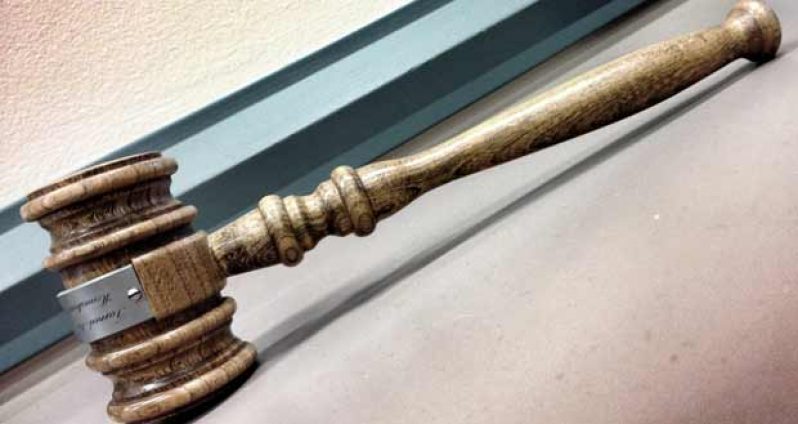Magistrate correctly convicted appellant for uncustomed goods
IN 1968, the appellant Ricardo Da Silva was charged in the Magistrate Court with two offences of knowingly keeping uncustomed goods, the allegation being that he kept two quantities of gasoline, petroleum oil and kerosene at two different places.He was convicted on both charges and appealed to the Full Court of the High Court.
Upon hearing the appeal, the Full Court, constituted by Chief Justice Harold Bollers and Justice Arthur Chung, found that the magistrate had ruled correctly.
The conviction and sentence were affirmed.
Before the Full Court it was argued that the particulars in the complaints lacked an essential ingredient in that the allegation should have included a reference to an intention to defraud the revenue; and that in order to succeed the prosecution must prove not only that the appellant knowingly kept uncustomed goods, but also that he knew that the goods were uncustomed.
The Full Court held the subsection, the contravention of which the appellant was charged with, did not require an allegation of the intention to defraud.
Further, the prosecution is required to prove that the appellant knew that the goods found in his possession were uncustomed, but this is done by showing prima facie that he was found in possession of goods which were subject to duty and then the onus is cast on him to show on a balance of probabilities that duty has been paid and the goods were in fact customed.
The appeal was dismissed and the conviction and sentence affirmed.
Eleven cases were referred to. C. Lloyd Luckhoo, Q. C., with David Singh appeared for the appellant while W. G. Persaud, Police Legal Adviser, appeared for the respondent.
Chief Justice Bollers who delivered the decision of the court said that in the Magistrate’s Court, the appellant was charged and convicted of two offences of “Knowingly keeping uncustomed goods” contrary to s. 216 of the Customs Ordinance, Chapter 809. The particulars of the two complaints were that the appellant (a) on December 10, 1967 , at New Hope, Pomeroon River, in the Essequibo Judicial District, knowingly kept uncustomed goods, to wit, six drums containing a quantity of gasoline, one drum of gasoline, and two drums of petroleum oil; and (b) on the said December 10, 1967 , at Plantation Glenhurst Estate, Pomeroon River, in the Essequibo Judicial District, knowingly kept uncustomed goods , to wit, 23 drums containing a quantity of gasoline , eight drums of kerosene, and one drum of petroleum oil, both contrary to s.216 (c) of the Customs Ordinance, Chapter 809 [G].
The circumstances were that on the day in question, a customs officer, accompanied by a policeman, executed a writ of assistance on the appellant’s premises at New Hope, Essequibo, and subsequently carried out a search of his premises at Glenhurst, Pomeroon River. At these places, the customs officer found the articles, which formed the subject matter of these proceedings.
At New Hope, the nine drums and contents in relation to the first complaint were found exposed to view, but at Glenhurst, 13 of the 32 drums which formed the subject matter of the second complaint, were discovered carefully concealed by coconut branches and hidden from public view.
The appellant, when challenged by the customs officer who informed him that he had executed a writ of assistance in search of uncustomed goods, stated that all of the drums belonged to him and contained gasoline.
The appellant, when asked if he had bills for the gasoline, produced a bill for the purchase of eleven drums of gasoline in relation to the quantity of drums found at New Hope, and in respect of the drums found at Glenhurst, the appellant stated that he had no bills and that he had bought the fuel from different persons, the Chief Justice disclosed.
Continuing, the Chief Justice added: “The offence consists in knowingly harbouring uncustomed goods, and in our opinion that means that the accused knowingly harboured goods and also knew that they were uncustomed.
“To prove a conscious harbouring, it would usually be enough to show that goods which were subject to duty were found in the possession of the accused.
“If they were found in his house, warehouse or other place under his control, that would establish a prima facie case that he knowingly harboured them, though no doubt, he could rebut this by proving that he did not know of their presence, for instance, by showing that someone had dumped them there without his knowledge or privity.
“Once it is proved that he knowingly harboured goods subject to duty, S.259 throws on him the onus of proving that the goods are in fact customed.
“To do this he would have to prove that the duties have actually been paid, or at least that the goods had been declared and the Customs Officers had, in the exercise of a discretion, which as is well-known they are allowed, permitted them to enter.”
Chief Justice Bollers went on to say: “There was ample evidence upon which the magistrate could have found a prima facie case proved by the prosecution that the appellant had knowingly kept uncustomed goods , which he knew to be uncustomed, and it was then on the appellant , in accordance with s. 261 of the Ordinance , to show on a balance of probabilities that the proper duties had been paid in respect of those goods ,or that the goods had been lawfully imported ,or he did not know they were uncustomed.. This onus the magistrate found he had failed to discharge, and therefore the Magistrate was correct in the conviction which ensued.
“For these reasons then, we do not consider the points taken by learned counsel to be sound, and we would dismiss the appeal and affirm the conviction and penalty imposed by the magistrate.
“Appeal dismissed. Conviction and sentence affirmed.”




.png)









